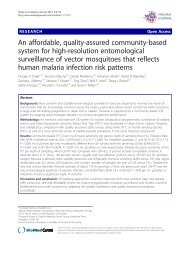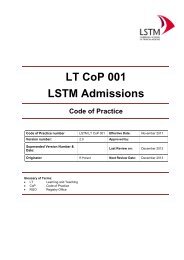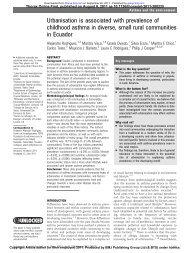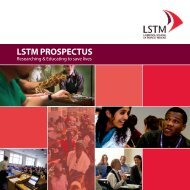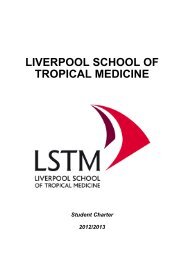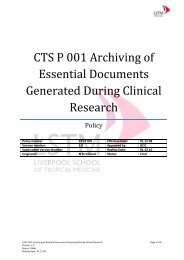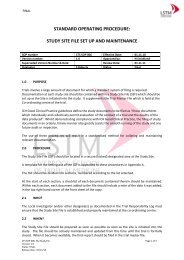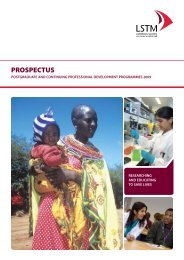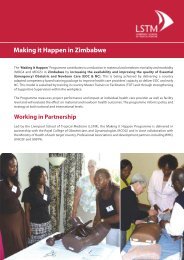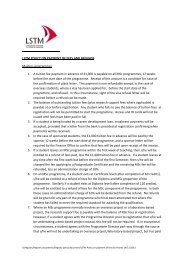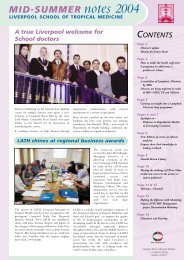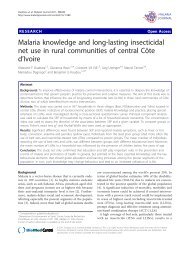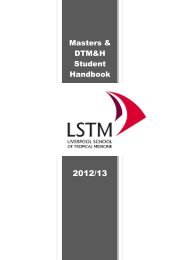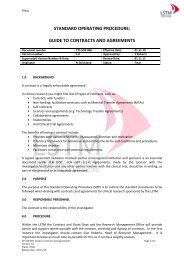Annual Report 2008 - 2009 - Liverpool School of Tropical Medicine
Annual Report 2008 - 2009 - Liverpool School of Tropical Medicine
Annual Report 2008 - 2009 - Liverpool School of Tropical Medicine
You also want an ePaper? Increase the reach of your titles
YUMPU automatically turns print PDFs into web optimized ePapers that Google loves.
CHAIRMAN’S FOREWORD<br />
“LSTM is at the hub <strong>of</strong> an<br />
expanding portfolio <strong>of</strong> activities<br />
to bring the benefits <strong>of</strong> innovative<br />
research to those who are<br />
grappling with the ravages <strong>of</strong><br />
tropical diseases around the world.”<br />
Last year I wrote in the middle <strong>of</strong> the global<br />
financial crisis about the contrast between the<br />
developed world, caught in a spiral <strong>of</strong> greed<br />
and fear, with the challenges facing those who<br />
are exposed to tropical diseases. One year later<br />
it is hard to be entirely optimistic. Certainly<br />
we are beginning to climb out <strong>of</strong> the hole<br />
which we dug for ourselves – but at the cost<br />
<strong>of</strong> millions <strong>of</strong> unemployed and a reduction in<br />
the value <strong>of</strong> funds underpinning such things as<br />
research into combating tropical diseases.<br />
The work <strong>of</strong> <strong>Liverpool</strong> <strong>School</strong> <strong>of</strong> <strong>Tropical</strong><br />
<strong>Medicine</strong> (LSTM) remains as vital and urgent<br />
as ever. It is not threatened financially in the<br />
short term, as new funding streams continue<br />
to be attracted by the talented individuals led<br />
by the Director, Pr<strong>of</strong>essor Janet Hemingway.<br />
We have tested LSTM’s financial resilience<br />
into the longer term and are confident that<br />
the organisation continues to be prudently<br />
managed. The modest but encouraging<br />
surplus this year should be seen in the context<br />
<strong>of</strong> a continued strengthening <strong>of</strong> the balance<br />
sheet and a healthy cash flow. Moreover the<br />
relationship with <strong>Liverpool</strong> University is being<br />
clarified and reinforced. At the same time<br />
funding from the Higher Education Funding<br />
Council for England (HEFCE) has seen a<br />
substantial increase, as a result <strong>of</strong> a successful<br />
Research Assessment Exercise and mirrors<br />
growth from third party donors. We therefore<br />
face the future with continuing confidence.<br />
This year marks the retirement <strong>of</strong> our President,<br />
Sir Mark Moody-Stuart, after a tenure <strong>of</strong> some<br />
six years. Fortunately his invaluable support<br />
will not be lost to us, as he remains Chairman<br />
<strong>of</strong> the Board <strong>of</strong> the Innovative Vector Control<br />
Consortium (IVCC). This successful Product<br />
Development Partnership, hosted by LSTM,<br />
is in the process <strong>of</strong> seeking re-financing from<br />
various donors, principally The Bill & Melinda<br />
Gates Foundation. We are delighted that Sir<br />
Richard Evans, a strong advocate <strong>of</strong> LSTM for<br />
many years, has agreed to succeed Sir Mark as<br />
President.<br />
With the new Centre for <strong>Tropical</strong> and<br />
Infectious Diseases (CTID) in <strong>Liverpool</strong> now<br />
complete, and refurbishment <strong>of</strong> our existing<br />
facilities proceeding, LSTM is at the hub <strong>of</strong> an<br />
expanding portfolio <strong>of</strong> activities to bring the<br />
benefits <strong>of</strong> innovative research to those who<br />
are grappling with the ravages <strong>of</strong> tropical<br />
diseases around the world. Two things stand<br />
out to me from last year’s story <strong>of</strong> success:<br />
firstly, LSTM practically never undertakes<br />
activity on its own: it is virtually always working<br />
in partnership with donors, host governments,<br />
other research establishments and delivery<br />
agents on the ground. This requires a<br />
particularly co-operative type <strong>of</strong> working<br />
which is not always easy to practise. Secondly,<br />
our geographic field <strong>of</strong> activity is rapidly<br />
expanding. While Africa remains in aggregate<br />
the main focus, new ventures are being<br />
addressed in Saudi Arabia, Syria, China, India<br />
and indeed Libya. Sadly in one sense, there<br />
seems no limit to demand on our resources.<br />
In addition to IVCC, two other subsidiaries are<br />
making their contribution to the work <strong>of</strong> LSTM.<br />
The consultancy arm, <strong>Liverpool</strong> Associates<br />
in <strong>Tropical</strong> Health (LATH), is undergoing<br />
considerable reshaping as it faces changing<br />
market conditions and increased competition.<br />
Its adoption <strong>of</strong> a new identity and logo is<br />
symbolic <strong>of</strong> its decision to work even more<br />
closely with LSTM, to share expertise and to<br />
bring to market many <strong>of</strong> the unique skills <strong>of</strong><br />
our researchers. Our travel clinic business, Well<br />
Travelled Clinics, have opened new premises in<br />
Chester and relocated to expanded premises<br />
opposite CTID.<br />
This report can barely do justice to the<br />
remarkable work <strong>of</strong> all who are associated with<br />
the <strong>Liverpool</strong> <strong>School</strong> <strong>of</strong> <strong>Tropical</strong> <strong>Medicine</strong> – its<br />
staff, donors, collaborators, <strong>of</strong>ficers and friends.<br />
But I hope you will find within it something <strong>of</strong><br />
the character <strong>of</strong> this vibrant institution.<br />
James Ross<br />
LSTM ANNUAL REPORT 3



